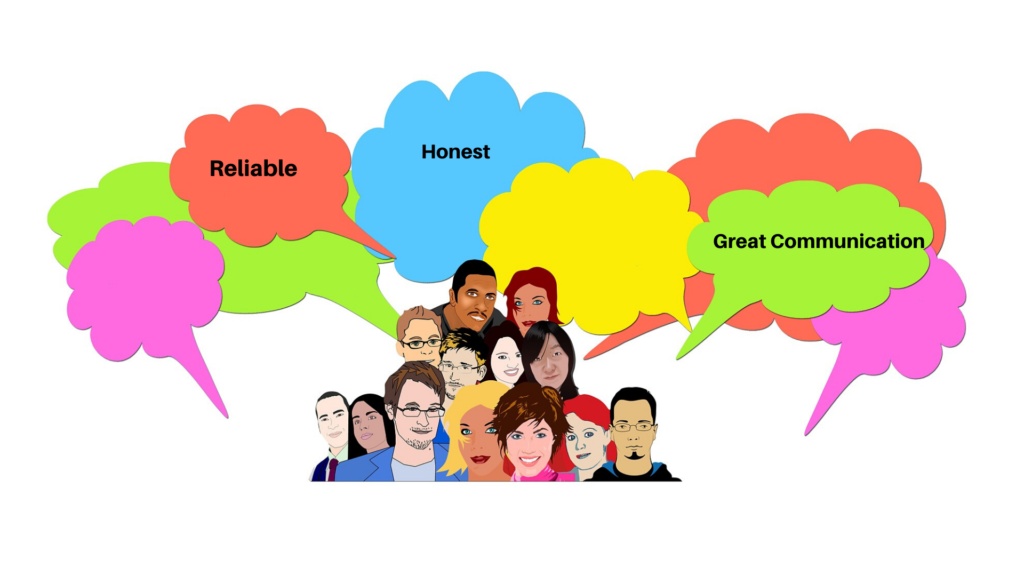Before I begin…
The typical usage of a “USP” is a “unique selling proposition.” That sounds too corporate for me, so I’ll use the much simpler “unique selling position.”
In simplest terms, your unique selling position is what makes your services or products stick out among the noise of your competitors.
The more niche – say you sell revamped electronics for only one style of guitar (Fender Stratocaster) – the easier it is to pinpoint your USP (and your audience!). The bigger and more conventional your services or products, the harder it is to stick out.

Regardless of your business’s size, for success, a company must not only spend serious energy defining their USP, but also continually refine and exploit that USP. This goes whether you’re an agency selling SEO services, a small niche company non-fluoride toothpaste for toddlers, a large company selling exotic motorcycles, or a doctor.
This USP should be an underlying theme among all marketing and sales material.
A business may have a few USPs for each product or service, but the main one – the one your entire company is built upon – demands major attention.
And the sooner the better. I made a mistake of not defining ContentMender’s unique selling position when I launched in early 2017. My initial plan was to become a “do-all” agency and offer every possible digital marketing service available.
But it didn’t unite with my business model, which relied on mostly hand-picked freelancers and SEOs for higher for less staff bloat and higher profit margins, and I couldn’t quite target the audience I wanted. I refocused and, as Eric Ries taught me in The Lean Startup, pivoted. Soon I was focused on:
- Creating expertly written content that is search-friendly and goes through an exclusive seven-layer creation process.
- Addressing Technical SEO because without a technical sound platform the content won’t perform as well.
- Providing all content in a “plug n’ play” format for easy uploads
This led to the company’s current mission statement that has multiple USPs contained within:
ContentMender is an SEO-driven content marketing agency with a sharp focus on written content. We use only expert writers that are matched to the your industry, and all content goes through an exclusive seven-layer creation process that involves SEO, strong storytelling and equally strong editorial standards.
All content and SEO strategies are created to help define, refine and exploit your business’s unique selling position within its market. We also make sure your website’s platform and site architecture are beyond sound from a technical SEO perspective. And if we’re not uploading content, each piece is delivered in a “plug n’ play” format for an effortless process.
Yes – it’s long, but for most, I can get away with just saying our core USP:
“ContentMender is an SEO-driven content marketing agency with a sharp focus on written content that exploits a company’s unique selling position through storytelling.”
I italicized “current” above before mentioning ContentMender’s mission statement. Businesses grow and change, and I believe so should the USP. The core should always remain, but things will flex out in the beginning as you’re establishing your business and finding what works for you.
The USP must constantly be reinforced through all marketing efforts. This reinforcement and exposure of a USP must be part of all marketing material – from social media to the way a customer service rep to talks to a client to the C-suits talk to their investors.
In short, the USP must be embedded in the proverbial fabric of a company.
The following six tactics will help you create, refine and exploit your unique selling point.
Ask the Prospect; Think like the Prospect
First, take a look at how the most successful businesses attract clients.
Smart businesses spend serious time finding out everything they can about their target clients (when I say clients I also mean customers and/or patients). This takes extra amounts of work, and the more niche-based your business, the easier the process.
You want to pinpoint your client’s needs, being as granular as possible, and find out what motivates them to have those needs.
This process typically helps a business create products or services that feed the exact needs of these target clients.
For example, ContentMender likes to attract prospects – mostly SMBs – that are actively searching for SEO and content writing (blogs, page content, educational articles, etc.). We attract these clients through our blog and guest posting about our services on reputable websites like Forbes and Search Engine Journal.
We then trace where these leads are from – say a Forbes article – and ask those prospects what influenced them to reach out. For ContentMender, many of our prospects are attracted to expert blog creation and long-term thinking. This helped us refine our unique selling position because we simply listened and responded.
From there, you can begin thinking like those prospects when creating your USP. This process does double duty because it also makes you focus on your service or product offerings, and what’s not working.
Ask Existing Customers Why They Choose You
Businesses get so deep in collecting/deciphering data of new clients/prospective clients that they forget about analyzing their existing clients.
Don’t be afraid to ask why existing clients – especially the long-term ones – have chosen you. They likely saw something unique within your services or products, and they can help point that out to you – and quickly.
These helped us develop the “plug n’ play” portion of our blogging. We asked a few of our longer-term clients what made us stand out among others offering SEO and content creation. It had nothing to do with price or case studies, but rather our transparent project management documents, consistency in delivering what’s on those project management documents, and one that was unexpected – our “plug n’ play” offering where we deliver blogs or content pages to developers in a copy/paste format that’s fully optimized.
If You’re a Product Company, Have a Tangible USP
Zappos’s USP revolved around stellar customer service. The company offered free shipping and free return shipping for any shoe. That means if something didn’t fit, you simply returned. They also offer a full refund on shoes that aren’t worn for 365 days and have non-scripted customer service centers.
The USP made Zappos stand out among the crowd – so much at Amazon bought them out for $850 million in 2009.
That takes us to Amazon; Jeff Bezos is literally obsessive with customer service. This has allowed Bezos to lead some serious risk-taking adventures to back his USP, including Amazon Prime that is backed by offering lowest costs along with fast and free shipping, and the Kindle, which took a HUGE gamble from altering the way people read books.
Be Authentic About What You Do Different Through Storytelling
Be a storyteller when exploiting your USP. But make sure that the story is authentic.
Don’t gloat. Don’t have a “me, me, me” marketing message when exploiting your USP. Tell people what you different by telling your story – a consistent and authentic story.
One of our taglines is “Why ContentMender? Because every brand has a story to tell.” That story should be authentic as it amplifies what you do that makes you different.
 Spend Time Refining and A/B Testing
Spend Time Refining and A/B Testing
This is the ongoing portion of the business. As you educate yourself and adapt to better technology, you’ll grow and learn from mistakes. As you do this, you should revisit your existing USPs, and constantly refine them.
If you’re like Amazon and are obsessive about customers, finding new ways to “wow” them will help build upon your USP of having stellar customer service.
Exploit Your USP Through Blogging
Your blog is the ideal place to continually exploit your company’s USP. Blogging takes your company on a long-term journey, and with time is one of the most lucrative elements of a marketing campaign. Blogs drive the main message of your company, and they constantly give back.
Besides providing prospects information to show your authority, and more info to your current readers/customers/clients to create more loyalty, they can be used throughout other tools, such as social media and newsletters.
Before you begin blog marketing with your USP, first, you need to make sure your platform is technically sound for SEO.
Second, you must post with the same voice and frequency. Don’t sporadically post content. Your readers and the search engines despise it. Even if you don’t have a solid audience yet, with consistent blogging efforts, you soon will.
We write loads of stories about blogging in, well, our blog.
Even if it’s a simple CTA that reminds the audience of the USP, or links to the About page that mentions the USP, make sure it’s present.
Concluding Thoughts
A company’s USP should be incorporated into all marketing efforts of a company – especially all content marketing efforts including the blog.
If your brand gets a migraine while trying to discover your USP, you may be too conventional and too much like the competition. It’s time to pivot, and maybe rethink your business services or products. The five tactics above will help ease that process.
Finally – don’t fear; when I launched ContentMender my idea was a do-all digital marketing agency. One that would offer everything from paid advertising to complete web development services. But I have the most passion for the written side of things and SEO, so I developed a business that focuses on the written content portions of SEO campaigns – a service many say is the most difficult to complete.
We do offer upsells to clients for social media and web design, to name a few, but we have trusted white label partners who have highlighted those services in their USPs. I’d rather use the best than spend energy building out another portion of the business – something I wrote about in my latest piece on white-label partnerships: White Label Partnerships Kick-Ass for ROI.
Don’t be conventional. Be different. Be Unique. Offer something, again as Seth Godin would say, truly remarkable. Then take the time to create a USP, and continually exploit that USP within your marketing efforts – especially your content-marketing efforts.




